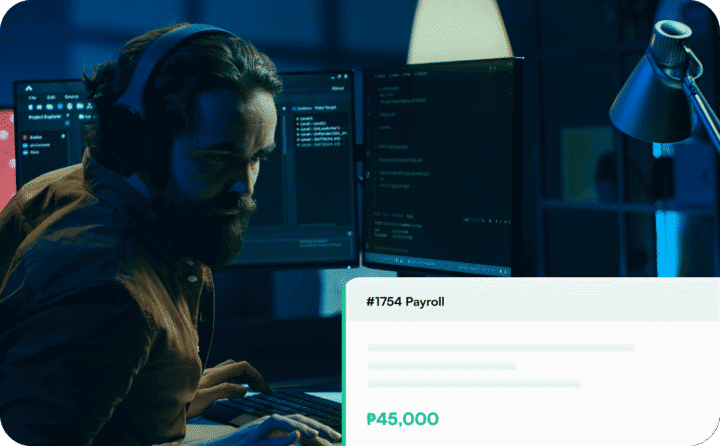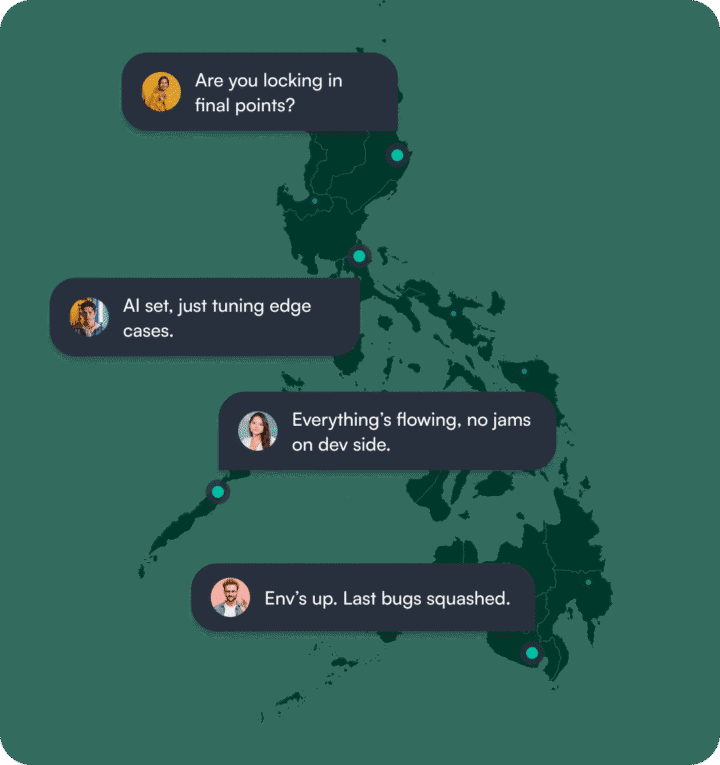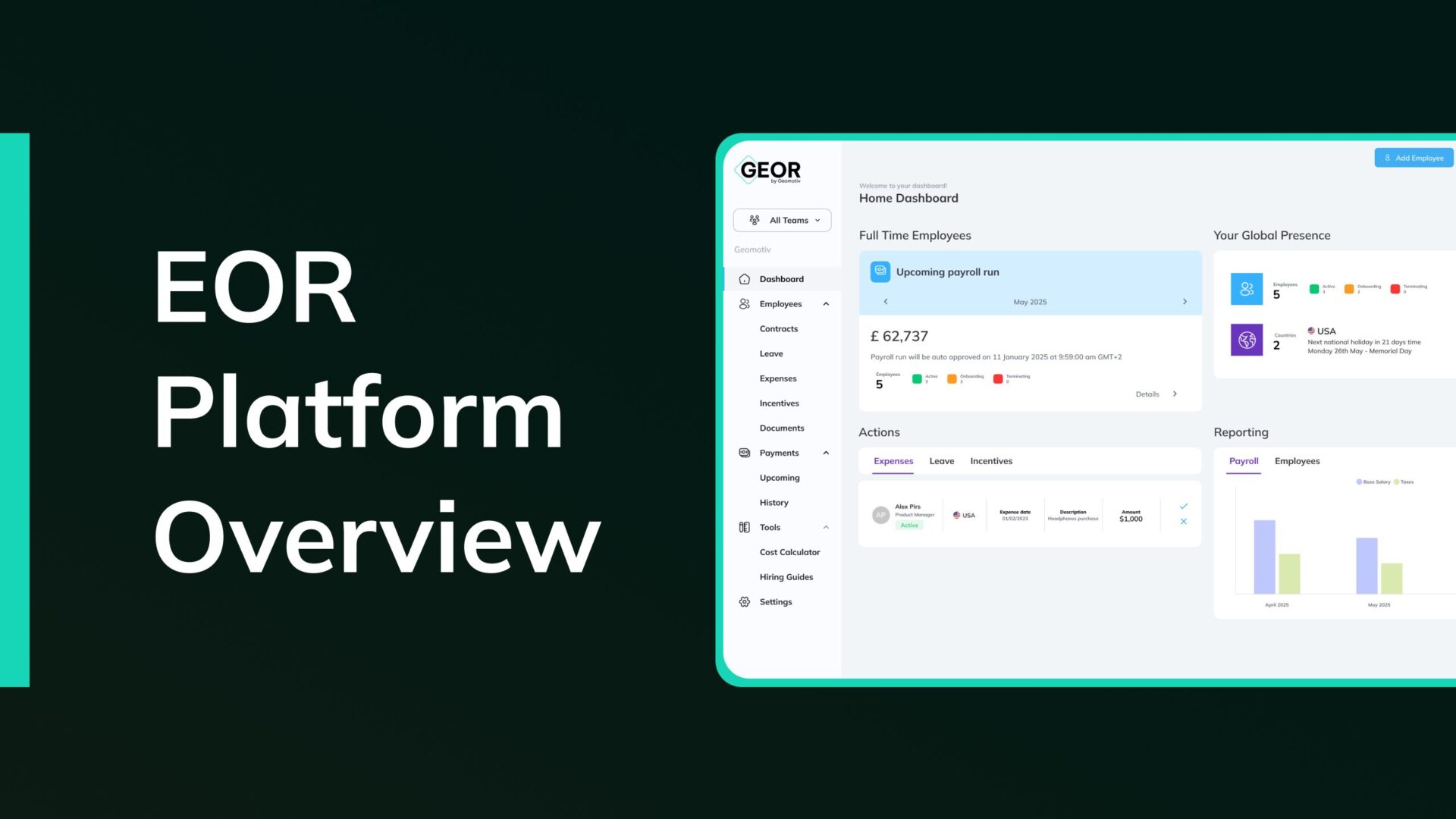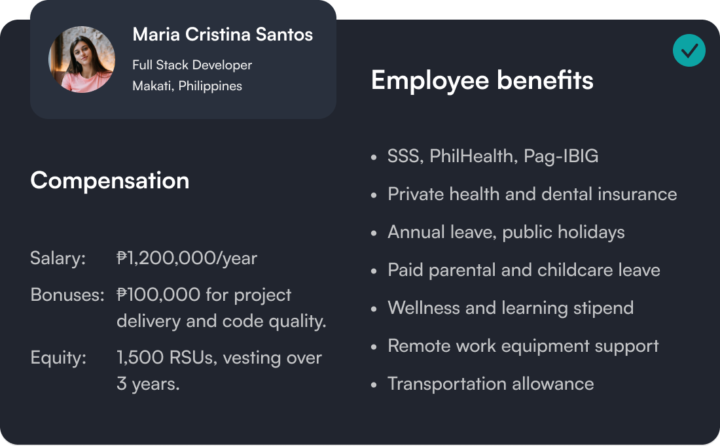- Source qualified Philippine developers through compliant employment processes.
- Connect with verified technical professionals from our extensive talent pool.
- Full payroll, contributions, taxes, and filing management included.
- Specialized solutions for SaaS, fintech, AI, and frontier tech expansion.
- Complete onboarding in 7 days with full legal coverage.
Employer of Record in the Philippines
Enter the Philippines market within one week with complete deployment and legal protection.

Supercharge talent onboarding
in the Philippines
Don’t settle for partial solutions — get full recruiting power with our Employer of Record services in the Philippines.

Philippines
English-speaking, tech-savvy workforce with global experience in remote software delivery.
Manila, Cebu, and Davao host thriving developer ecosystems serving US, EU, and APAC.
Prime location for offshore hiring, supported by tax incentives and pro-foreign ownership laws.
Ranked 95th globally for ease of doing business, with an estimated GDP of $497–500 billion in 2025.
Filipino and English (business)
Philippine Peso (₱)
₱420k – ₱2.2m ($7k – $38k)
Philippine IT hubs
| Hubs | Sector focus | Avg. local software developer pay |
|---|---|---|
| Metro Manila (Bonifacio Global City, Makati) | Fintech, enterprise SaaS, startups | ₱1.25m/year ($22k) |
| Cebu IT Park | Offshore services, BPO, cloud engineering | ₱1.2m/year ($21.2k) |
| Davao Park District | Regional tech operations, mobile apps, e-commerce | ₱1.15m/year ($20.3k) |
| Clark Freeport Zone | Advanced manufacturing, logistics tech | ₱1.2m/year ($21.2k) |
| Iloilo Business Park | Software services, back-office automation | ₱1.15m/year ($20.3k) |
Note: Based on 2025 local full-time developer salaries in companies onboarding through EOR. Figures reflect typical compensation ranges for mid-level roles in international teams.
Sought-after tech stack
Tech employment regulations in the Philippines
Complete guide to hiring requirements, statutory obligations, and employment standards for tech companies.
Philippine Labor Code, Dole Decrees, Workers’ Compensation Act, Occupational Safety And Health Standards
Philippines issues company-sponsored work permits based on role, compensation, and qualifications.
- Special Work Permit (SWP) for short-term work up to 6 months.
- 9(g) Pre-arranged Employment Visa for professionals, renewable annually.
Remote and hybrid teams are treated like onsite teams and must be properly classified and contracted.
Data Privacy Act of 2012 (Republic Act No. 10173).
- PhilHealth - Total 4.5% of compensation, split evenly between employer and employee (capped at ₱60k).
- Pag-IBIG - Employer and employee each contribute 2% of salary (capped at ₱5k).
Employment roadblocks in the Philippines
Why Philippine talent acquisition takes longer than expected.
Mandatory social contributions
Employees and employers must contribute to SSS, PhilHealth, and Pag-IBIG funds as required by law.
Work visa restrictions
Strict visa requirements and quota limits apply for foreign workers based on role and company size.
No benefits for contractors
Freelancers lack social security and leave benefits; only employees under contract are covered.
Termination rules
Dismissals allowed only for just cause or redundancy, with mandatory procedural safeguards.
Employment contract compliance
Contracts must clearly specify salary, duties, hours, leave, and termination terms under local law.
Data protection and IP rights
Companies must comply with DPA and clearly define intellectual property ownership.
Comprehensive EOR in the Philippines
The complete Philippine employment infrastructure your company needs.

- Exceptional English-speaking talentEngineers proficient in English with strong experience across every tech stack.
- Best-in-class HR operationsContracts, pay stubs, SSS, PhilHealth, Pag-IBIG, and benefits aligned with Philippine labor law.
- Strategic work authorisationsEfficient handling of work permits, special visas, and other foreign employment authorizations.
- People-first protectionsClear employee rights, social security safeguards, and effective dispute resolution build loyalty.
- Regulatory clarity for smart scalingStreamlined filings and compliance supported by deep local regulatory knowledge.
- Complete employee journeyFrom contracts and onboarding to termination, we manage every HR step with precision.
Explore our EOR platform
See how the Global Employer of Record platform helps you seamlessly manage your global workforce — from hiring and compliance to payroll and employee requests — all in one place.

Southeast Asia operations made simple
With over 15 years in global tech workforce management deliver the proven results that fast-scaling teams rely on.
Inside our EOR services
Here is what our Employer of Record offers.

Work permit applications, contract negotiating, SSS, PhilHealth, Pag-IBIG registration, and health insurance setup.
Timely payments with mandatory social contributions and income tax filings handled smoothly via the automated platform.
Protecting your team, intellectual property, and sensitive data with clearly defined roles and contracts, tailored for the Philippines.
Designed for developers, product teams, and digital roles in the Philippines:
- Social security and housing fund contributions;
- Paid annual and sick leave;
- Parental and childcare support;
- Private health and dental plans;
- Remote work reimbursements;
- Learning allowances;
- Performance bonuses;
- Optional life and critical illness insurance;
- Equity plans including ESOPs and RSUs.
Philippines EOR pricing
Competitive rates for local and global teams.
- Access to an exclusive talent pool
- Onboarding within 7 days
- Payroll and tax management
- Built-in security and compliance
- IP and invention rights protection
- Workforce management platform
Add-ons:
Recruitment, Visa services, Premium benefits, and a Dedicated HR team.
per employee/ month.
A basic EOR package with flexible service add-ons.
Developer salaries by sectors
Current compensation benchmarks across Philippine technology industries and specializations.
| Sector / Role | Junior | Mid-level | Senior |
|---|---|---|---|
| Fintech | ₱450k / $8.1k | ₱900k / $16.2k | ₱1.35m / $24.3k |
| Enterprise SaaS | ₱430k / $7.8k | ₱880k / $15.8k | ₱1.32m / $23.7k |
| Offshore / BPO | ₱350k / $6.3k | ₱700k / $12.6k | ₱1.05m / $18.9k |
| Cloud Engineering | ₱480k / $8.6k | ₱950k / $17.1k | ₱1.42m / $25.6k |
| Logistics Tech | ₱400k / $7.2k | ₱850k / $15.3k | ₱1.28m / $23.2k |
| AI / ML | ₱500k / $9.0k | ₱1.0m / $18.0k | ₱1.5m / $27.0k |
| Cybersecurity | ₱470k / $8.5k | ₱930k / $16.9k | ₱1.4m / $25.4k |
| HealthTech | ₱420k / $7.6k | ₱870k / $15.8k | ₱1.3m / $23.6k |
| EdTech | ₱410k / $7.4k | ₱860k / $15.6k | ₱1.29m / $23.5k |
Note: Salary figures represent average annual compensation for software developers across junior, mid-level, and senior roles in leading Philippine tech sectors. Data sourced from local salary surveys and industry reports for 2025. Actual pay may vary based on company, role, and experience.
Philippines hiring sorted
No other provider matches our reliability and compliance assurance when you need a trusted partner. Share your goals, and we’ll craft your Philippines talent acquisition strategy.

Client Feedback
Leading Philippine EOR providers
These are the top players in the market. Choose wisely — you need partners who deliver excellence and flawless execution every time.
Designed for global tech trailblazers
Whether onboarding your existing talent or tapping into our vetted tech network, our Employer of Record ensures your team is fully operational within 7 days. Every employment detail is meticulously aligned with Philippine labor laws and business regulations. Combining advanced automation with expert local support, we deliver fast, customized, and accurate workforce solutions.
Bring your vision.
Build bold teams creatively.
FAQs
An Employer of Record legally hires your team in the Philippines, handling contracts, payroll, tax filings, and mandatory social contributions like SSS, PhilHealth, and Pag-IBIG.
To onboard local or foreign talent quickly without establishing a Philippine legal entity – while ensuring full compliance with labor, immigration, and tax laws.
Mostly startups and mid-sized tech firms in SaaS, fintech, gaming, biotech, AI, and cybersecurity, especially those entering the Southeast Asian market.
Yes. We manage work permits and visas, handle onboarding, and ensure compliant employment and relocation processes.
Yes. We onboard full-time staff and registered freelancers, providing compliant contracts and invoicing setups.
Yes. Our service supports flexible working arrangements with proper contracts, home-office allowances, and localized payroll management.
Local hires typically start within 1 week. Foreign workers may take 3 to 5 weeks, depending on work permit processing times.
We manage monthly payroll, SSS, PhilHealth, Pag-IBIG contributions, tax withholdings, and annual reporting, fully aligned with Philippine regulations.
Standard packages include private health insurance, social security contributions, paid leave, parental benefits, learning stipends, and performance bonuses.
Yes. We strictly comply with the Philippine Data Privacy Act (DPA) and international standards such as GDPR to ensure data protection and confidentiality.
Best employment practices in the Philippines
Simplify HR, payroll, tax, and workforce management with solutions built for local realities.
Отправляя данную форму вы подтверждаете свое согласие с Политикой конфиденциальности















